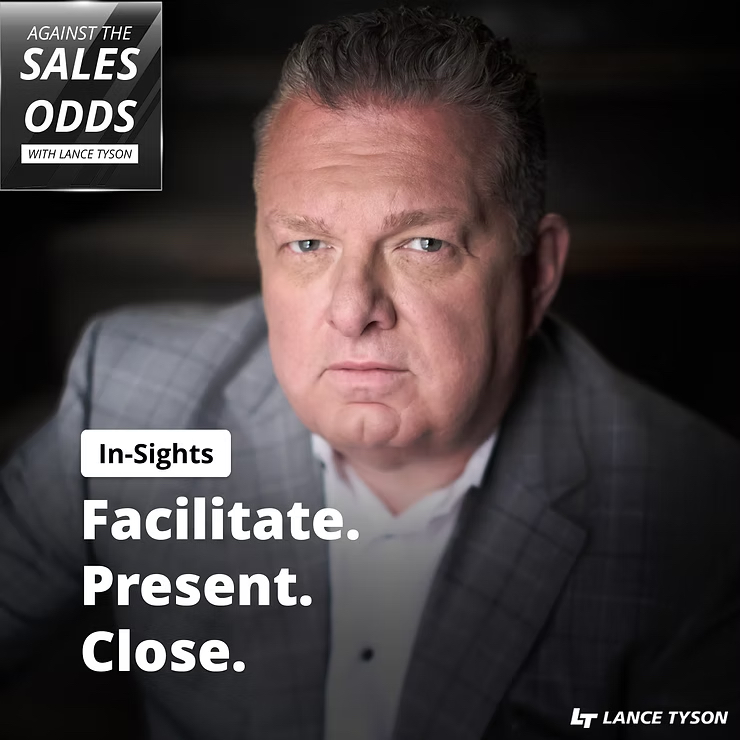In today’s episode of the In-Sights series, we discuss the three-step sales process of Facilitate. Present. Sell. This is your masterclass on turning conversations into conversions. Whether you are a seasoned pro looking to sharpen your edge or a rising sales leader ready to level up, you will get actionable strategies, real-world stories, and expert insights to help you command the room and win more business. Learn how to engage your audience, influence decisions, and master the critical skills every high-performing seller needs in today’s competitive landscape.
Lance is the bestselling author of Selling Is An Away Game and The Human Sales Factor.
Check out Lance’s Bestseller Books:
The Human Sales Factor – https://tysongroup.com/books#thehumansalesfactor Selling is an Away Game – https://tysongroup.com/books#sellingisanawaygame
Check out Tyson Group’s Open Enrollment Programs: https://www.tysongroup.com/openenrollment Download our playbooks: https://www.tysongroup.com/sales-playbooks Schedule a call with one of Tyson Group’s member: https://bit.ly/41YJW7K Subscribe to our Newsletter: https://tysongroup.com/#weeklynewsletter
Follow Lance across Social Media:
LinkedIn – https://www.linkedin.com/in/lancetyson/ Instagram – https://www.instagram.com/lance_tyson_1/ X – https://x.com/lancetyson
Love the show? Subscribe, rate, review, and share! https://www.tysongroup.com/podcast
—
Listen to the podcast here
In-sights: Facilitate. Present. Close.
The Sales Facilitation Edge
Every day I’m home, I go to Tim Horton’s in Dublin, Ohio. Dublin, Ohio, Timmy Hohos. Does anybody know what Timmy Horton’s is? Tim Horton’s. Alright. I go to Tim Horton’s about 7:30, 8:00. I usually have Bella with me. Bella’s my bulldog. She gets very excited about going to Tim Horton’s because she gets Timbits and she likes DQ. She is very verbal when she knows I’m going. I usually pull up, I get an extra-large cup of coffee, 3 creams, 2 Equals. Helen, for the last fifteen years, has served me, “The 3 creams, 2 Equal guy.” That’s who I’m referred to. I call her Trouble. I go, “What’s up, Trouble?” I wouldn’t say we have a relationship. I think we have an active rapport going for the last fifteen years.
Facilitating The Conversation
I don’t think I’m getting invited to Helen’s family picnics. I’m not inviting Helen to mine. Does that make me a bad person or her? No. That just means we have an active rapport. I’m a customer. She provides a service. That’s something you can do. Don’t go further than you need to because it’s just not about rapport. I’m going to get into that in a little bit. It’s also about credibility. Somebody brought up here is, those docs look at us as a waste of what? I would write this down, every one of you. If you are going to sell a $1 million product, a $500,000 product, a $50,000 product, you better be getting good at two things. Selling time is one thing. Do you know what the most expensive pieces of jewelry are typically? Rings and watches. Do you know what they both represent? Commitment to time.

Sales Process: Do not go further than you need to.
I can tell you, my ring, it’s heavy. I’m married to Lisa. If we’re on a ferry or something, and that ferry goes down, don’t hang on to me. I’m going to the bottom. It’s a heavy ring. My shoulders pulled out a little bit. I’ve been married to Lisa for 27 years and she’s been married to me for 27 years. That’s times two. Because I have 27 in and she has 27 in. That’s 54. See, we’re not good at math. Fifty-four years, commitment to time.
You all have to get good at selling time. You also have to get good at first principles with time, especially with those docs. Let’s think about first. This is not anywhere on the slide. Here are your first principles, though. If you were selling the doc, when you do meet with them, and I think it’s an admissions, I think it’s when you sell the other two products too, or services too. First principle one is selling is can you facilitate the conversation so it doesn’t look like you’re wasting time?
Have you ever gone into a sales call and in the beginning, you start to ask questions? That’s part of your job. You’ve got to ask some questions. Has anybody ever told you there’s no stupid questions? They lied to you. There are dumb questions. There are stupid questions out there. I’ve heard thousands of them asked by salespeople. There are stupid questions. Do you want me to give you one?
I was with some salesperson and he let me know very quickly that he was an undergrad from Princeton and he got his Master’s from Georgetown. His question in a role-play, modeled-out session was he was asking a tech company how they made money. I go, “You’re asking that tech exec how they make money?” He goes, “Yeah.” I go, “What are you trying to find out? Nobody’s going to answer that question.”
He goes, “Yes, they will.” I go, “Nobody’s going to answer that question. That’s a financial statement question. What are you trying to seek, Mr. Georgetown?” “I want to know about their sales process.” I go, “Why don’t you just ask them what the prospect journey is, what the customer journey is?” That would get there. How they make money is a financial question. Stupid question.
I didn’t call him stupid. I didn’t make him feel good about his education, but I’m kidding. We’ve got to sell time. You’re going to be able to facilitate a conversation. All of you have to facilitate so it doesn’t look like you’re wasting time. What I brought the question up for, have you ever asked questions in the beginning of a conversation, they’re answering all your questions. As you ask more questions, their answers get shorter and shorter? You’re all shaking your head. You’re starting to behave like a bad homicide detective down here in Atlantic City. You’re like, “Where were you? What’s your opinion of this?” Typically, we don’t facilitate the conversation while they don’t know why you’re asking questions or you haven’t stated a benefit for them to ask questions.
I was on a sales call with one of my salespeople and I try not to sell. I try to evaluate when I go on sales calls because I’m like an addict when I sell. I have to open my mouth, I have to sell. I can’t help myself. I’m like a shark. He’s just getting walloped by this guy. The guy opened up and he just goes, “I don’t have a lot of time.” It was like a trucking company. “I don’t have a lot of time. Just show us what you got.”
John, my sales guy, he starts ripping off everything we do. I say, “Wait. Listen, how much time do you have?” The VP on the other side says, “I have about fifteen minutes.” I said, “We don’t want to take your time and waste your time with a lot of information you may or may not need. Why don’t you let us ask you 3 or 4 questions, then we can hone in the information and give you exactly what you’re looking for. Is that fair?” That totally makes sense. Now, all of a sudden, we weren’t dumping information. We weren’t showing up and throwing up or like Michael Clark Duncan in The Green Mile, like, “Ah.”
You know what some of you do? You get into some of those calls and you’re just dumping information out. Who’s been there before? “I can’t help myself. I’m still talking.” Repeat after me. Ready. The more I talk, the less credible I am. I need to learn to shut up. Everybody with me. You know you get those calls, too and you’re looking at yourself on film. You’re like, “I just went off.”
The more you talk, the less credible you are. Learn to shut up.
Responding To Opinions
It’s usually the ones that you’re not prepared for either like it came hot off of another one and you just go. That’s because you’ve got to get them involved, because think about what you do. If I have to facilitate a conversation, that would include some evaluation or discovery because chances are, every one of your buyers has done some homework on you.
It’s too readily available. They read the reports, they looked you up, they went online, they know somebody, they got an opinion. You’ve got to assume they’re going to have an opinion. The sooner you get their opinion out, the more you can respond to their opinion and sell into it. It’s facilitate, present and sell.
What’s selling? It’s not presenting. Selling’s actually an exchange of ideas. Think about it this way. Anybody here bake? Who bakes? Who eats baked goods? Okay, we can apply it. It’s good. Any of my bakers out there, this would be mindset of the buyer. Mindset of the buyer is if I have to facilitate, present, sell, mindset of the buyer, they probably might see me as a waste of time. They might already have information that I don’t have. I need to know where they stand. I need to bake. That’s selling.
If you’re baking, and say you’re baking some cupcakes, how would you know if the cupcakes are done? What do you do to the cupcakes to make sure they’re done? Toothpick. You put that toothpick in there and you pull it out and it got gunk on it. What does that mean? It’s not done. Sometimes, we underdo our prospects. What if you open the oven, stick the toothpick in and it breaks upon entry? What does that mean? Sometimes, we overdo prospects. Our job is to really think about what the mindset of the buyer is. We think of our strategies. What’s going to be my approach?
Important Links
The Human Sales Factor Selling is an Away Game Check out Tyson Group’s Open Enrollment Programs Download our playbooks Schedule a call with one of Tyson Group’s member Subscribe to our Newsletter Lance Tyson on LinkedIn Lance Tyson on Instagram Lance Tyson on X Love the show? Subscribe, rate, review, and share!




